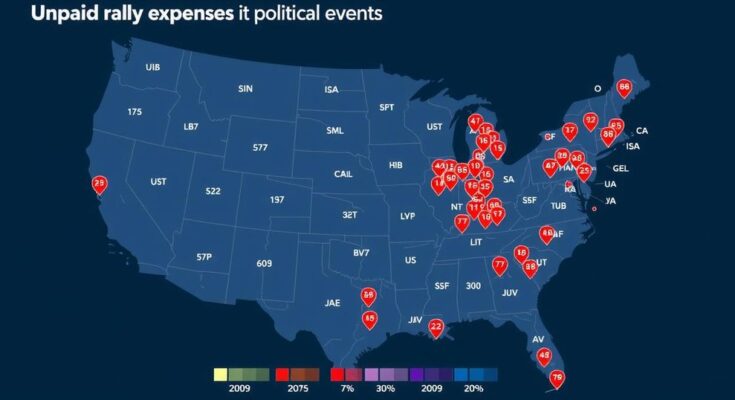Donald Trump faces numerous unpaid debts related to his campaign rallies, including significant expenses owed to various U.S. cities for security and police services. As he contests the 2024 presidential election against Kamala Harris, these financial obligations, alongside a drop in small-dollar donations, present challenges for his campaign. Previous failures to meet payment deadlines have led some jurisdictions to require upfront payments for future events, reflecting a broader concern over taxpayer burdens and campaign accountability.
Donald Trump, the Republican presidential candidate, remains burdened with numerous unpaid debts stemming from his campaign rallies, including substantial costs for security and police overtime. As he campaigns for the 2024 presidential election against Democratic contender Kamala Harris, Trump is faced with mounting financial obligations not only from his current campaign but also from previous ones and his business ventures. This trend of unpaid dues is particularly notable as he prepares to enter the battle against Vice President Harris, who currently enjoys a slight edge in various polls, having raised significant funds in comparison to the Trump campaign. Trump’s financial struggles are amplified by a troubling history of outstanding payments to multiple U.S. cities, which are owed for expenses incurred during rallies. For instance, Prescott Valley, Arizona, reported that Trump’s campaign owes $25,737.32 from a 2022 rally. Similarly, Mesa, Arizona, has an unpaid invoice of $64,477.56 from an October 2018 rally, emphasizing that cities often bear the costs for policing and safety measures associated with such events. El Paso, Texas, also claims that Trump’s campaign owes it $569,204.63 for a 2019 rally, while St. Cloud, Minnesota, reported an outstanding amount of $208,935.17 for overtime wages related to a rally in July of this year. Other municipalities, such as Spokane, Washington, and Lebanon, Ohio, maintain unresolved invoices, further complicating the Trump campaign’s financial narrative. Given the persistent issue of unpaid dues, some jurisdictions have begun to necessitate upfront payments for costs related to campaign events. This shift reflects the growing need for city officials to protect taxpayers from bearing the costs of political rallies, highlighting the discontent surrounding Trump’s record of payments. Moreover, the campaign’s financial inadequacies are compounded by Trump’s extra legal costs, including payments to former attorney Rudy Giuliani, further threatening its viability as the election nears.
The outstanding financial obligations of Donald Trump are an ongoing concern as he campaigns for the presidency in 2024. His history of unpaid dues, particularly to cities for rally-related expenses, has raised questions about his financial practices and accountability. As he faces a highly competitive race against Kamala Harris, Trump’s campaign has seen a decline in small-dollar donations, creating additional financial strain. This situation is aggravated by longstanding unpaid bills that trace back to both his political career and earlier business activities, suggesting a pattern of financial negligence. The financial dynamics of Trump’s campaign are crucial to understanding its current trajectory and potential future developments as the election draws near.
In conclusion, Donald Trump’s campaign is beleaguered by a history of unpaid debts, particularly related to rally costs that remain unsettled across various U.S. cities. As the 2024 presidential election approaches, these financial issues raise concerns about the viability of his campaign. With significant debts, declining small-dollar donations, and mounting legal fees, Trump faces a daunting challenge as he seeks to reclaim the presidency against an opponent who is currently outpacing him both in fundraising and polling. The need for transparency and accountability in his financial dealings could play a pivotal role in the unfolding electoral landscape.
Original Source: www.aljazeera.com




